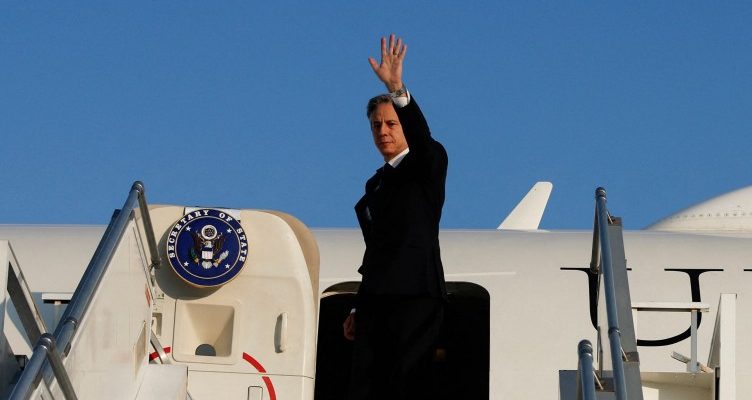On Sunday, when most of America was still asleep, Antony Blinken also sat with Mahmud Abbas. The US Secretary of State met the President of the Palestinian Authority at his official residence in Ramallah in the West Bank, as the highest-ranking guest from Washington since Hamas’ terror in Israel. The station was not officially on the route of his crisis tour, which since Thursday has taken him halfway around the world in nine days via Tel Aviv, Amman, Ankara, Tokyo, Seoul and New Delhi.
The two politicians had last met three weeks earlier in Jordan, shortly after Hamas’ attack on Israel and before the Israeli military’s increasingly violent reaction. Blinken has now told Abbas about his call to Israeli Prime Minister Benjamin Netanyahu to minimize the damage to the civilian population in Gaza, as the New York Times learned. They are working on bringing more humanitarian aid to the enclave. In Tel Aviv the chief diplomat from the State Department urged for protection for Palestinian civilians and for “humanitarian breaks”, the latter demand came to nothing for the time being.
Cracks run through Biden’s party
Joe Biden’s administration wants to prevent the war in the Middle East from getting completely out of hand. And it’s also about the American domestic climate, because Biden is coming under pressure domestically. The left wing of his Democrats had behaved inconspicuously for a long time, in complete contrast to the right wing of the Republicans. But cracks are now spreading through the party, a year before the presidential election in November 2024.
For the progressive camp, loyalty to Israel has traditionally gone too far, especially since the bombings in Gaza. Most Democrats in Congress, however, still support the ally and are appalled that the Republican majority in the House of Representatives wants to combine the $14 billion aid package for Israel with cuts in funding for the US tax authorities. In addition, protests against Israel are increasing at US universities and among the Arab electorate. There is sometimes open anti-Semitism, and distrust of Muslims is rising at a similar rate.
During his quick visit, Biden, despite all understanding of grief and anger, warned Israel not to react as unwisely as the USA did after the Islamist attacks on September 11, 2001. His envoy Blinken has been in this mood for days in search of moderation. The USA is also asking itself what will happen in the future without Hamas’ dominance in the Gaza Strip. Blinken had said a revived Palestinian Authority should administer the territory once fighting is over, although many Palestinians consider the group irrelevant. Abbas, it is said, could imagine helping with the administration. First, through his Wafa news agency, he calls for “an immediate end to Israel’s devastating war against the Gaza Strip” and quick help with medical supplies, food, water, electricity and fuel.
The day before, at his meeting with representatives of Arab states in Amman, the US Secretary of State said that everyone involved was of the opinion that the status quo of a Hamas-controlled Gaza Strip could not continue after the war. He discussed with his Arab partners how a path towards a two-state solution could be pursued. Blinken didn’t get any more specific.
On Friday in Israel he emphasized his support for a separate Palestinian state. In Jordan he is said to have explored whether Arab states would be willing to participate in a multinational peacekeeping force in the Gaza Strip. At a news conference with his Egyptian and Jordanian counterparts, he also noted that the United States was concerned about violence by extremist Jewish settlers against Palestinians in the West Bank. He had already stated this in Tel Aviv – during an appearance in front of journalists that Netanyahu did not attend after his meeting with Blinken.
Nasrallah “only” sends tirades
Blinken thanked “countries throughout the Middle East” that have played a “significant role in preventing the Israel-Hamas conflict from spreading.” Even before the talks with the other foreign ministers, he had praised the Lebanese government. It was not only in Israel that it was noted with relief that Hezbollah boss Hassan Nasrallah had uttered tirades of abuse against Israel in his first appearance after the Hamas terrorist attacks, but had not declared war.
According to Blinken, Amman also discussed ways to expand aid deliveries to the Gaza Strip. “A hundred trucks move through the Rafah border crossing every day, but that is not enough,” Blinken said. He is in favor of a “humanitarian ceasefire”. The Jordanian Foreign Minister Ayman Safadi, however, like Abbas and others, called for an immediate ceasefire in order to provide for the 2.3 million Palestinians in the Gaza Strip and to achieve easier conditions for the release of the hostages. At the same time, he accused Israel of war crimes and said the country should not be above international law.
Qatar also warns that the bombing of the Gaza Strip is complicating efforts to find the hostages kidnapped by Hamas. The US rejects a ceasefire, arguing that Hamas would benefit from it. When US President Biden was on his way to church on Saturday and was asked whether there was progress in efforts for a “humanitarian pause” in Gaza, he said “yes” and gave the thumbs up. Blinken landed in Iraq on Sunday evening for a surprise visit.

